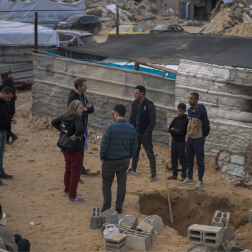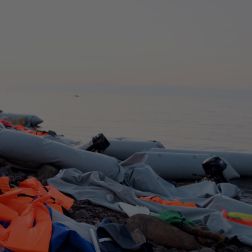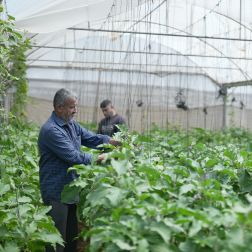- 4 mins read time
- Published: 18th August 2017
Searching for safety: lessons from Syria's refugees
What is life like for Syrian refugees in Lebanon? Oxfam conducted research to find out how safe refugees feel and to understand the challenges they face. For Oxfam researcher Nour Shawaf, it was a humbling process.
I thought I knew it all, I thought I had seen it, I thought I had read about it, I thought I had heard all their stories… After all, I am Lebanese, I have Syrian and Palestinian friends, I have been interacting with refugees on a regular basis for the past four years, I speak their language and I follow the news closely! Why would I not know it all?
Well I was definitely wrong. I knew nothing at all.
“Every time we went to a place the war would follow us.” She personified war and it scared me. My imagination took me beyond the discussion. I dropped my papers and just listened to her. The young woman sitting in front of me was my age. She had experienced multiple displacements and the war was following her. This was not just another research exercise, and this young woman talking to me was not just another story.
While carrying out Participatory Protection Research for Oxfam in Lebanon to explore the perceptions and expectations of refugees from Syria over the past, present and future, my own perceptions and expectations were altered. The stories refugees from Syria told left me completely shocked.
Reality struck me hard, especially when people started describing their routes from Syria to Lebanon. I had heard about the “mountain.” It is the word all refugees from Syria use to indicate they have come into the country through unofficial borders. But never had it occurred to me that the ‘mountain’ was a “death plateau.” People talked about walking for hours and days, being left by smugglers in the middle of nowhere, walking in the snow or under the sweltering sun, and having to leave their belongings en route to carry children and elderly on their backs when they could no longer walk.

Bekaa Valley informal refugee settlement in winter. Credit: Sam Tarling/Oxfam
They went through the “mountain” looking for safety from the bombings, the shelling and the airstrikes. There are neither bombings nor shelling nor airstrikes where they are now… but they have still not found safety!
The rampant fear and the deteriorating living conditions are obstacles that prevent them from feeling safe. Their inability to meet their basic needs, obtain legal statuses and avoid arrests, deprive them from the sense of safety they are longing for.
Though this came as no surprise to me, experiencing it along with the refugees who volunteered to participate in the research shifted my perspective. They explained to me the range of factors they had to worry about. If they leave home, they have to worry about the checkpoints. If they stay home they have to worry about raids. If they find a job they have to worry about inspectors along with different forms of exploitation. If they don’t find a job they have to worry about meeting their families’ basic needs.
In their own words, their quest to find safety is costing them their dignity: “When you are displaced you start ignoring your dignity to find safety”. When an older Lebanese woman made the aforementioned statement, she summarised everything the refugees were trying to tell me in one sentence. The times may have changed, but the experience of displacement remains the same.

A portrait of Jemaa Al Halayal and his two-year-old daughter, Lebanon. Credit: Sam Tarling/Oxfam
Despite the dire conditions and the lack of better prospects, Ahmad told me: “We won’t lose hope”. Ahmad is a 22-year-old Syrian refugee from Homs. He fled his hometown at the very beginning of the war. He had always dreamt of becoming a Computer Engineer. Although his dreams have not unfolded so far, he is striving to achieve the best given the current circumstances. He says: “Even if you are a refugee, you must have a message, a mission. I want to serve my country, my people. I hope I can spread a positive message.”

As part of our research we invited participants to take photos. The above photo was taken by Ahmad (of his former home), as it reminds him of his past. I sometimes tend to forget that Ahmad was not a refugee before 2013 and that he led a different life. This photo is my constant reminder.
People like Ahmad are what keeps me going, that much I know!
Posted by Nour Shawaf, Protection Research and Policy Advisor for Oxfam in Lebanon




